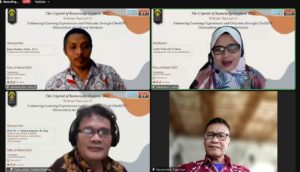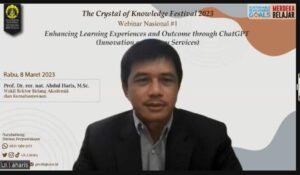
Artificial Intelligence (AI) can be used to find out the needs of library users so that the library can provide services according to their needs. This can be seen in the use of Generative Pre-Trained Transformer (Chat GPT), which is an AI-based robot capable of providing answers to users’ questions. The occurring interaction through text can be said to be natural just like communication between humans.
For this reason, in commemoration of the 40th anniversary of Universitas Indonesia (UI) Library, National Webinar #1 “Enhancing Learning Experiences and Outcomes through Chat GPT (Innovation on Library Services)” in the series of events the Crystal of Knowledge Festival 2023, on Wednesday (08/03) was held. This webinar invited three speakers, which are Professor and Researcher of Blockchain, Robotics, Artificial Intelligence Networks (BRAIN) IPB University, Prof. Dr. Ir. Yandra Arkeman, M.Eng .; Lecturer in Library and Informatics Science, the Faculty of Humanities (FIB) UI, Dr. Fuad Gani, S.S., M.A.; and UI Librarian, Sony Pawoko, S.Sos., M.T.I., moderated by UI Librarian, Laely Wahyuli, M.Hum.

Vice Chancellor for Academic and Student Affairs UI Prof. Dr. rer. nat. Abdul Haris, M.Sc., In his opening remarks, conveyed that the rapid development of technology provides a challenge for educational practitioners to utilize it in developing learning media. “UI is fully committed to supporting the development of information technology-based media and services to support learning and gain recognition of an international standard university,” said Prof. Haris in the webinar which was attended by more than 800 participants on Zoom Meeting and the UI Library YouTube Live Streaming.
Meanwhile, Head of UI Library Mariyah, S.Sos., M.Hum., said that library services are largely determined by the role of librarians. A librarian must have the competence and be able to adapt to information technology in order to serve library users well. The competence of librarians must also be improved over time, both through formal and non-formal education so that they are expected to be able to adapt to changes and the emergence of ChatGPT.
According to Prof. Yandra, ChatGPT has several advantages: it has a wide scale of knowledge, adaptability, consistency, and can always be accessed at any time. In fact, ChatGPT has a formal and informal reference style that can be utilized by library users. On the other hand, ChatGPT certainly has drawbacks: it provides inaccurate or irrelevant answers, is unable to fully understand the context, is unable to show empathy or social sensitivity the same as humans, and is unable to process complex or abstract information as good as humans.
From an academic point of view, Dr. Fuad said ChatGPT has the potential to offer various benefits, including increasing student involvement in lectures, collaboration, and broad accessibility of learning resources. However, this tool also raises various challenges and concerns, especially those related to honesty, academic integrity, and plagiarism.
Of the various benefits provided by ChatGPT, librarians can use ChatGPT to search for information sources, create search strategies, paraphrase, synthesize information, and make citations and bibliography. As a UI Librarian, Sony provides four tips for responding to information obtained from ChatGPT, which are verifying any information obtained from credible sources, conducting consultations with supervisors or lecturers, acknowledging or citing information obtained from ChatGPT, and entering ChatGPT as a source in the bibliography.



